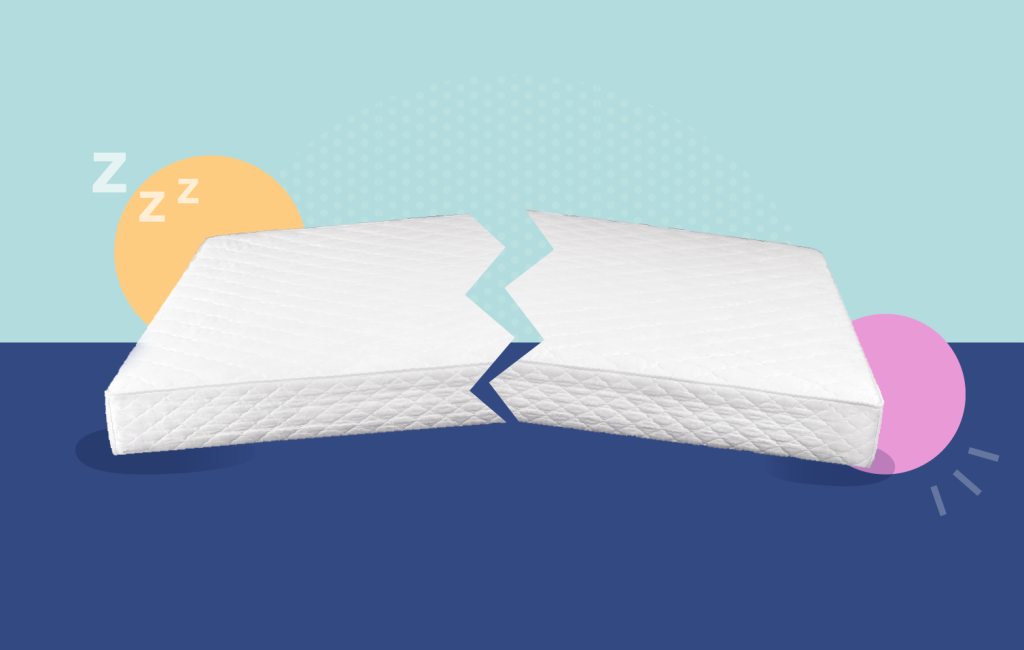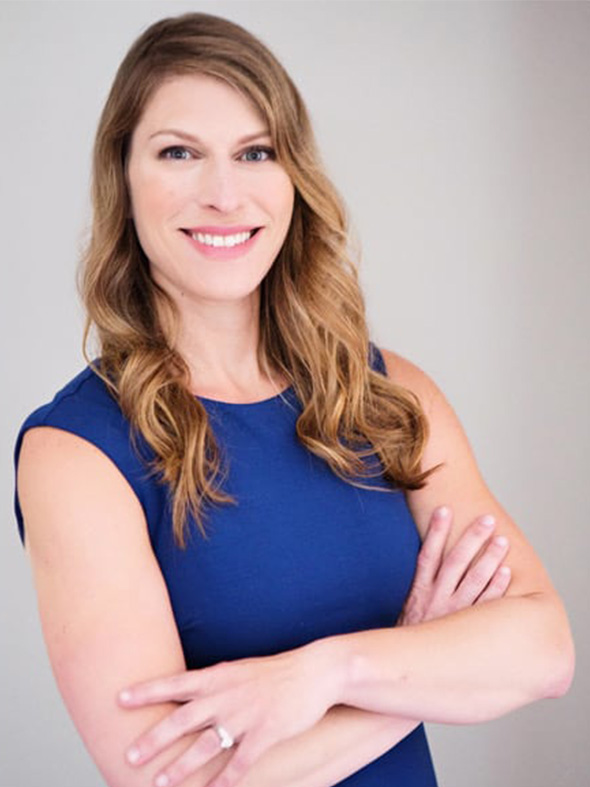
Long Story Short
- The term “sleep divorce” refers to sleeping in a separate bed or bedroom from your partner. (1)
- Sleep divorce is on the rise, with over one-third of Americans now occasionally or regularly sleeping in a separate room from their partner. (2)
- Couples who sleep in separate bedrooms often enjoy better sleep quality, an improved quality of life, and a healthier relationship. (3)
- Sleep divorce is most common amongst millennials, with 43 percent occasionally or regularly sleeping separately from their partner. (2)
- Men are nearly twice as likely as women to go sleep in a separate room, with 45 percent of men doing so compared to 25 percent of women (2)
The sleep divorce trend is becoming increasingly popular, with individuals valuing sleep health more and more. Lack of sleep can lead to side effects such as mood swings and poor concentration, so it’s unsurprising that people are taking new measures to ensure they have the best routines possible, even if that means sleeping solo.
Note: The content on Sleepopolis is meant to be informative in nature, but it shouldn’t be taken as medical advice, and it shouldn’t take the place of medical advice and supervision from a trained professional. If you feel you may be suffering from any sleep disorder or medical condition, please see your healthcare provider immediately.
What Is Sleep Divorce?
Sleep divorce is when couples choose to sleep in separate beds or rooms to improve their sleep quantity or quality and overall well-being. (1) People often make this decision because of differences in sleep habits and patterns that interfere with their sleep, Shelby Harris, a clinical psychologist and Sleepopolis’ director of sleep health, tells us. (6) “The goal of partners sleeping separately is to give both the best opportunity to get a quality full night’s rest,” she adds.
What Happens When Couples Stop Sleeping Together?
Better sleep might be the goal when it comes to sleep divorce, but couples who sleep apart may experience some changes. These include:
- Sex life changes: Sleeping separately can mean fewer spontaneous moments of intimacy, including physical affection and sex, although there’s limited research in this area (6) You’ll likely need to be more intentional about staying connected, whether that’s setting aside quality time together before bedtime or finding new moments throughout the day for affection. Planning intimacy and sex can feel less organic to some, but it might actually strengthen the bond for others, sometimes even making it more exciting. (6)
- Practical challenges: If sleep divorce means sleeping in a different bedroom, you’ll need to set up a whole second sleep sanctuary, complete with a mattress, bedding, and all the bedroom essentials. Most homes aren’t exactly overflowing with extra rooms, so you might need to get creative with your living space or consider whether your budget can handle furnishing a second bedroom. (6)
- Emotional impact: Some people may experience loneliness during those quiet nighttime hours, especially if they’re used to sleeping with their partner, and one study of about 1,000 adults showed that having a co-sleeping partner is linked to better sleep quality and mental well-being for many people. (6)(3) Insecurity may also creep in, with one or both partners questioning if the relationship is on shaky ground, and if not addressed, there could be tension if one person feels forced into the arrangement. (6) Some couples may combat this by going to bed together and snuggling up until they’re actually ready to sleep — then, each person ends up in their own sleep spaces.
Benefits of Sleep Divorce
While the idea of sleeping apart might raise eyebrows, the benefits of a sleep divorce are similar to those of improved sleep overall and can include better sleep quality, mood, and improved concentration. Let’s break down the perks:
- Better sleep quality: Finally, uninterrupted sleep! No more fighting over blankets, adjusting to different temperature preferences, or waking up to your partner’s snoring. Each person gets to create the perfect sleep environment, leading to better rest for both. (2)
- Sharper mind: “When people get better sleep, they often see improvements in mood and cognitive functioning, including concentration and processing speed,” Lauren Neaman, Psy.D., a licensed clinical psychologist and a diplomate of the Academy of Cognitive and Behavioral Therapies (A-CBT), tells Sleepopolis. (7) Well-rested brains are sharper, making it easier to stay focused and think clearly throughout the day. (8)
- Happier mood: Poor sleep — whether it’s not enough or constantly interrupted — can negatively affect your mood and make you more anxious and irritable. (4) On the flip side, getting quality sleep can stabilize your mood and help keep stress levels in check. (4)
- Stronger relationship: While some might worry about growing apart,many couples find their relationship satisfaction improves with sleep divorce, Neaman notes, especially if one partner’s sleep habits are causing tension. Sleep deprivation can make couples more hostile, frustrated, and less empathetic, but when you’re well-rested, you’re less likely to snap at each other over small things. (4) (9)
- Better sex life: There’s a connection between sleep and sex, and science backs this up. Better sleep can contribute to more energy and higher libido, potentially improving your sex life (10). On the flip side, sexual activity may help you sleep better, too. (11)
Do Couples Who Sleep Apart Grow Apart?
Actually, it’s often the opposite — couples who don’t sleep together don’t inherently grow apart. Instead of drifting, couples may find that sleeping separately allows them to be more present and engaged during their time together. (1) (5) (6)
But it comes down to staying intentional about connection. Many couples find success by creating a cozy bedtime routine together before heading to separate rooms, scheduling regular date nights to maintain that spark, and finding new ways to share physical affection throughout the day. (12)
Sleep Divorce Statistics and Facts
Let’s look at what the numbers tell us about the sleep divorce trend:
- Almost one-third (29 percent) of Americans have decided to sleep in a different bed or space to better meet their partner’s sleep needs. (1)
- In terms of who moves to another room, men are more likely to do so, with 45 percent occasionally or consistently sleeping in another room, compared to 25 percent of women. (2)
- Age also influences sleep divorce trends: (2)
- Millennials take the lead, with 43 percent sleeping separately at times or consistently
- Generation X follows at 33 percent
- Generation Z comes in at 28 percent
- Baby Boomers are least likely to sleep apart at 22 percent
Sleep Divorce Q&A
A lot of people have questions about sleep divorce, so we asked Sleepopolis’ director of sleep health Shelby Harris for some clarity on why people might try a sleep divorce, who may benefit most, and more.
What are the most common reasons you see people opting for a sleep divorce?
“The most common reason people opt for a sleep divorce is because one or both partners’ sleep quality is suffering. This is typically due to differences in sleep schedules, habits, and preferences, as well as sleep disruptions caused by one or both partners’ having a sleep disorder.”
When is the right time for a sleep divorce?
“Sleeping separately is not typically something I recommend first to couples, but if they have already tried tweaking certain areas of their existing routines and had no positive progress, then I may recommend they try sleeping separately. If someone is routinely not getting enough sleep or finds that they wake up frequently throughout the night due to disruptions from their partner, they should talk with their doctor or a sleep specialist.”
What kind of sleepers would benefit most from a sleep divorce?
“Those with a partner who works different hours, such as the night shift, may benefit from sleeping separately, which can reduce disruptions from one waking up or going to bed earlier than the other. Snoring is also a common reason couples choose to sleep in separate rooms, but it can also be a sign of sleep apnea, so it’s important to be evaluated by a sleep specialist if snoring is interfering with sleep.”
What are the top tips when sharing a bed with a partner to get the best night’s sleep?
“I recommend investing in a good mattress for couples and quality bedding that is comfortable and meets both partners’ sleep preferences, in addition to proper sleep hygiene.
“Sleep hygiene refers to the steps, lifestyle behaviors, and activities we practice surrounding our nighttime routine that can help promote high-quality sleep (limiting alcohol, caffeine, and screens before bed, winding down, timing naps appropriately, etc.).”
How to Tell if a Sleep Divorce is Right for You

Shelby Harris, clinical psychologist and Sleepopolis’ director of sleep health, shares her professional insight on navigating sleep divorce and why it shouldn’t carry a stigma:
As a sleep doctor, I work with a lot of patients who are in wonderful, healthy, loving relationships, but are totally different sleepers than their partners. Maybe you toss and turn all night while your partner snores. Maybe one of you can only fall asleep to the soothing sound of Netflix every night, and your spouse needs complete and total silence to drift off. Whatever the reason, it’s very common for partners to be a great match for each other in most aspects of life — and totally incompatible when it comes to sleeping.
That doesn’t mean your relationship is doomed or that you have to wander through life a sleep-deprived zombie. One potential solution: sleeping separately (whether in separate beds or rooms). Otherwise known as a sleep divorce, it can be an effective tool for you and your partner when you just can’t get any sleep.
If you’re wary of giving it a shot, you’re not alone — the name can throw people off, thanks to the negative connotations around the word “divorce.” There’s often a lot of shame involved — people are hesitant to speak up and admit they want to try it because they’re afraid it means their relationship is in trouble.
I worked for years with a couple who couldn’t find a way to sleep together. The husband snored, keeping his wife up at night. They tried everything: he was evaluated for sleep apnea (and nothing was found), they tried using earplugs, white noise machines. Nothing worked. When I suggested that they start sleeping separately, you could see the relief on their faces. It took a psychologist telling them that it was okay to give them the push they needed. And you know what? They’re happier and healthier now because they’re both sleeping better, and that allows them to connect with each other more meaningfully during the day.
Opting to sleep separately can mean that you’re completely committed to helping each other get the best sleep possible. It’s not a leap to suggest that getting more sleep can also improve your relationship, and if sleeping in separate beds or rooms is what helps you both, there’s no shame in that.
Now, for a sleep divorce to work, it should be fair. That means both partners are willing to give it a shot and that one person doesn’t secretly resent the other for suggesting it.
It also means that your sleeping arrangements should be equal (no hogging the comfortable bed while your partner is relegated to the lumpy couch!), and you both have to be open about discussing your sleep issues.
Lastly, it may mean having some sensitive conversations about intimacy and sex so that you can be sure that both your physical needs are being met once you’re no longer sleeping in the same room together. That might look like scheduling sex regularly or designating one bed for sex and cuddling before you go your separate sleep ways. But it’s time to do away with the stigma surrounding sleep divorce.
Sleep Divorce Alternatives
If a sleep divorce feels too drastic for you and your partner, there are several alternatives worth trying first. Here are some options to consider:
- The Scandinavian sleep method: Instead of sharing one comforter, each person gets their own duvet or blanket while sharing the same bed. (13) This option is especially helpful if you and your partner have different temperature preferences or if one of you tends to burrito-wrap themselves in the blankets.
- Earplugs and sleep masks: If a snoring partner or loud noise are sleep disruptors for you, look into a pair of good earplugs. Slip on a sleep mask if light sensitivity is an issue, and you might find these small changes make a big enough difference to keep you sharing the same bed. (14)
- Sound machines: Not a fan of using earplugs? Try a white noise machine instead — or mix it up with pink, brown, or green noise! (15) White noise blends all frequencies, while pink noise offers a deeper sound, brown noise is richer and bass-heavy, and green noise mimics calming nature sounds. The consistent background noise can help you drift off without feeling like you’re wearing anything to bed. (16)
- Split king: Sure, it might mean splurging a little, but think of it as having your own sleep space while still sharing a bed. A split king is essentially two twin XL mattresses combined to create one king-sized bed. Pair it with an adjustable base, and you’ve got the ultimate customizable setup where you can each control your side and choose different firmness levels.
- Address underlying issues: Sometimes sleep troubles point to deeper health concerns that need attention. If snoring is the issue, it’s worth seeing a healthcare provider to get checked for sleep apnea. (17) If anxiety keeps your partner tossing and turning, addressing that could help both of you rest easier. (18) Getting to the root cause might solve your sleep struggles without needing separate beds.
The Last Word From Sleepopolis
Sleep divorce might sound dramatic, but it’s really just about putting sleep quality first, which has many benefits. And thankfully, the stigma around sleep divorce is finally lifting. Whether you decide to sleep separately or try some alternatives first, prioritizing good rest doesn’t mean deprioritizing your relationship. After all, better rest can help you show up for each other during your waking hours. So, if separate beds mean restful sleep for you both, there’s absolutely nothing wrong with choosing sleep divorce.
Sources
- Americans opting for ‘sleep divorce’ to accommodate a bed partner. American Academy of Sleep Medicine. Accessed October 22, 2024. Americans opting for ‘sleep divorce’ to accommodate a bed partner (aasm.org)
- Over a third of Americans opt for a “sleep divorce”. American Academy of Sleep Medicine. Accessed October 22, 2024. Over a third of Americans opt for a “sleep divorce” (aasm.org)
- Fuentes B, Kennedy K, Killgore W, Wills C, Grandner M. 0010 bed sharing versus sleeping alone associated with Sleep Health and Mental Health. Sleep. 2022;45(Supplement_1). doi:10.1093/sleep/zsac079.009
- Palmer CA, Bower JL, Cho KW, et al. Sleep loss and emotion: A systematic review and meta-analysis of over 50 years of experimental research. Psychol Bull. 2024;150(4):440-463. doi:10.1037/bul0000410
- Haydon KC, Salvatore JE. Relationship stress, arguments, and sleep quality: A causal process analysis. Journal of Social and Personal Relationships. 2023;40(12):4268-4292. doi:10.1177/02654075231190592
- A ‘Sleep Divorce’ Might Be Exactly What Your Relationship Needs. Cleveland Clinic. Accessed October 22, 2024. https://health.clevelandclinic.org/sleep-divorce
- Ma Y, Liang L, Zheng F, Shi L, Zhong B, Xie W. Association Between Sleep Duration and Cognitive Decline. JAMA Netw Open. 2020;3(9):e2013573. doi:10.1001/jamanetworkopen.2020.13573
- Stepan ME, Altmann EM, Fenn KM. Effects of total sleep deprivation on procedural placekeeping: More than just lapses of attention. J Exp Psychol Gen. 2020;149(4):800-806. doi:10.1037/xge0000717
- Audigier A, Glass S, Slotter EB, Pantesco E. Tired, angry, and unhappy with us: Poor sleep quality predicts increased anger and worsened perceptions of relationship quality. Journal of Social and Personal Relationships. 2023;40(12):3803-3831. doi:10.1177/02654075231193449
- Martínez Vázquez S, Hernández Martínez A, Peinado Molina RA, Martínez Galiano JM. Association between sexual function in women and sleep quality. Front Med (Lausanne). 2023;10:1196540. doi:10.3389/fmed.2023.1196540
- Lastella M, O’Mullan C, Paterson JL, Reynolds AC. Sex and Sleep: Perceptions of Sex as a Sleep Promoting Behavior in the General Adult Population. Front Public Health. 2019;7:33. doi:10.3389/fpubh.2019.00033
- Tips to navigate a “sleep divorce.” Harvard Health Publishing. Accessed October 22, 2024. https://www.health.harvard.edu/staying-healthy/tips-to-navigate-a-sleep-divorce
- The Scandinavian Sleep Method: A Surprisingly Simple Fix for Couples Struggling With Blanket-Hogging. Cleveland Clinic. Accessed October 22, 2024. https://health.clevelandclinic.org/scandinavian-sleep-method
- Akpinar RB, Aksoy M, Kant E. Effect of earplug/eye mask on sleep and delirium in intensive care patients. Nurs Crit Care. 2022;27(4):537-545. doi:10.1111/nicc.12741
- Yoon H, Baek HJ. External Auditory Stimulation as a Non-Pharmacological Sleep Aid. Sensors (Basel). 2022;22(3):1264. Published 2022 Feb 7. doi:10.3390/s22031264
- Riedy SM, Smith MG, Rocha S, Basner M. Noise as a sleep aid: A systematic review. Sleep Med Rev. 2021;55:101385. doi:10.1016/j.smrv.2020.101385
- What is sleep apnea? National Heart, Lung, and Blood Institute. Accessed October 22, 2024. https://www.nhlbi.nih.gov/health/sleep-apnea
- Alwhaibi M, Al Aloola NA. Associations between Stress, Anxiety, Depression and Sleep Quality among Healthcare Students. J Clin Med. 2023;12(13):4340. doi:10.3390/jcm12134340
Harris, Shelby, PsyD, DBSM. Personal interview. July 15, 2023 Neaman, Lauren, PsyD, A-CBT. Personal interview. October 7, 2024.




























